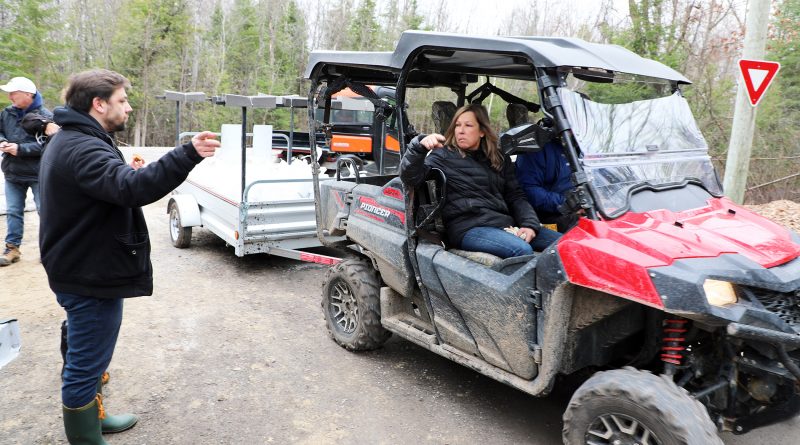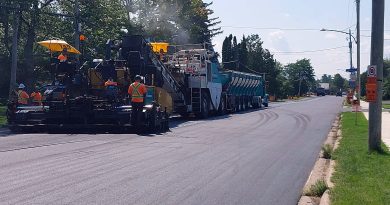Council briefs: Kelly applauds flood response, Transportation Master Plan updates approved, Provincial homelessness funding insufficient
By Jake Davies - West Carleton Online
(Editor’s note: As we did during the 2017 flood, 2018 tornado, 2019 flood and COVID-19 pandemic, we are making our coverage of potential extreme flooding in 2023 free access to our entire community providing flooding updates, on-site coverage, important information and resources to West Carleton and beyond, so those outside the area can better understand what is happing in our rural community)
CITY HALL – Coun. Clarke Kelly kicked off today’s (April 25) council meeting with a comment on flooding in West Carleton and the volunteer effort to support residents from rising water.
Mayor Mark Sutcliffe introduced the councillor just before roll call of the regularly scheduled meeting.
“Springtime always comes with heightened anxiety for many in Ward 5 who live in or near the Ottawa River watershed,” Kelly said. “What happened next was extremely encouraging and heart warming for me especially as a new councillor dealing with this for the first time.”
Kelly thanked the city staff’s leadership team for their strong work ethic and long hours.
“The city showed a willingness and ability to adapt to the changing needs of the residents and the volunteers,” he said.
Kelly thanked all of council for their support and named councillors Hill, Devine, Lo, Plante and Carr for coming to West Carleton to help with flood relief on the ground.
He also thanked the residents, volunteers at ground zero and West Carleton Secondary School students who filled more than 9,000 sandbags.
“When something like this happens, it takes more than the city and trucks full of sand to help people,” Kelly said. “It takes people giving their personal time doing the hard work of filling and carrying the sandbags and the backbreaking work of building walls. It takes donations of money, supplies, food and of course, lots and lots of coffee to keep these efforts going. To all the people who came, not only from the city but across eastern Ontario and western Quebec, to sandbag, donate money or make and deliver food, we could not have gotten through this without you. I would like to acknowledge and thank West Carleton Disaster Relief (WCDR) for their amazing work coordinating volunteers as well as volunteer operations.”
Kelly pointed out the organization’s experience during 2017 and 2019 flooding was instrumental this spring.
During the meeting, council approved Part 1 of the update to the city’s Transportation Master Plan (TMP), endorsing policies that will guide decision-making on Ottawa’s transportation system over the next two decades.
“New policies address growth and intensification, climate change, technology and new mobility, road safety and complete streets, healthy streets and communities, and affordability,” city staff released in a statement today. “The approved report also included the Active Transportation project list, as well as frameworks for prioritizing transit and road projects in the upcoming TMP Part 2.”
Staff will develop a capital infrastructure plan and identify the transit and road projects needed to accommodate future travel demands across Ottawa. That work is anticipated to come before committee and council in 2025 as Part 2 of the TMP update.
Council received the 2023-2026 provincial Homelessness Prevention Program (HPP) funding allocation.
“Of the additional $190.5 million annual HPP investment, the City of Ottawa was only allocated an increase of $845,100 annually, representing 0.4 per cent of the total allocation provincially,” staff said. “Without adequate funding, the city will not be able to meet the targeted number of new affordable/supportive housing options each year, operate new supportive housing or support innovative homelessness prevention initiatives.”
A detailed HPP investment plan will be presented to the Community Services committee on May 23 and council on May 24, for approval.
Council received a progress report on the Climate Change Master Plan – Ottawa’s framework to reduce greenhouse gas (GHG) emissions and respond to the current and future effects of climate change.
“The city has made progress on seven of the plan’s eight priorities since October 2021, advancing many key projects and programs to reduce emissions and build climate resiliency,” staff said. “The report outlines strategies to help achieve the master plan vision, such as developing a climate change resource plan and advocating to senior levels of government and external partners for accelerated, urgent climate action.”
The results of the GHG emissions inventory have been delayed pending a full review of the inventory process, to ensure methodologies and data sources align with best reporting practices. The inventories for 2021 and 2022 will be released after the review, later this year.
Council also received an overview of Bylaw and Regulatory Services activities in 2021 and 2022. The service has been heavily involved in the city’s COVID-19 response, in addition to work enforcing more than 50 municipal by-laws and provincial acts within Ottawa.
A comparative review of service requests completed in Ottawa, Hamilton, Toronto and Windsor over the past five years showed that Ottawa’s bylaw team completes significantly more requests per staff person each year and continues to be a provincial leader in efficiency. Staff continue to exceed expected response times for high-priority service requests, responding within 24 hours 90 per cent of the time in 2021 and 96 per cent of the time in 2022.













